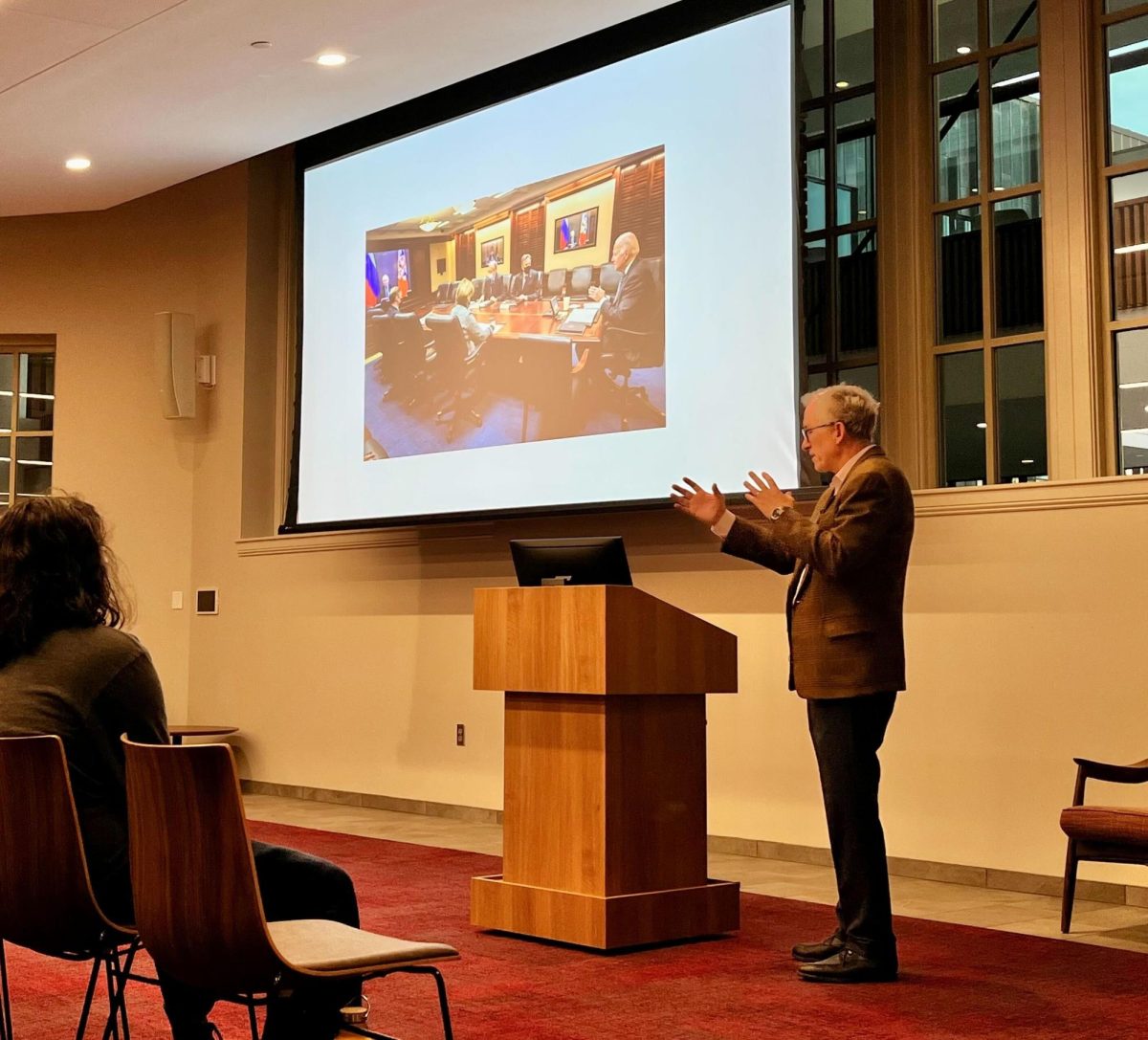When Eric Green `85 received an invitation to join the Biden administration as a special assistant to the president in 2021, he only planned on staying for a couple of months. Two years later, he left his position having directly contributed to the United States’ response to the Russia-Ukraine war.
Green returned to Grinnell College on Nov. 3 as a guest of the Rosenfield Program, providing insights about his time as senior director for Russia and Central Asia in the National Security Council. In this position, Green helped design and execute U.S. policy toward Ukraine, supporting the efforts to prevent and de-escalate the war with Russia. His retirement in February 2023 concluded a 32-year career in the U.S. Foreign Service, where he held leadership positions in overseas assignments in Russia, Poland, Iceland and Turkey.
“In October 2021, our intelligence agencies showed signs that Russia was going to invade Ukraine,” Green said, speaking to roughly 50 audience members. “It was very detailed information about the size of the force, the composition of the force, even the timing.”
Green said that over the next months, the U.S. State Department received intelligence predicting a February 2021 invasion of Ukraine. “We had roughly 100 days of warning, and it was really specific information,” Green said. “It was really horrific information when we saw the scale of what they were planning.”
“Our mantra was stable and predictable relations with Russia,” Green said, explaining how the Biden administration initially responded to intelligence on the invasion. “We didn’t have great fantasies about resetting the relations or having a friendship with the Russian government, but we thought there are discrete areas such as arms control, such as climate where we can at least find common cause with the Russians.”
The U.S. began planning a deterrence strategy, giving Russia “diplomatic offerings” and an “off-ramp” to incentivize de-escalation.
“Rather than rejecting and proposing some treaties that were very lopsided and unrealistic, we said, ‘Okay, let’s talk about some of the issues that you’re interested in,’” Green said. “Then we laid out for the Russians what we saw in the intelligence and said, ‘Hey, we see that you are planning this massive invasion of Ukraine. If you do it, we will impose sanctions like you haven’t seen before. We will also support Ukraine. And thirdly, we will react within NATO in terms of our deployment of forces.’”
In every decision, Green said the administration was guided by two principles — having no regrets and doing everything possible to deter the Russians.
“All the experts in Moscow said no, this is not going to happen,” Green said, referencing how Moscow responded to U.S. intelligence. “We agreed on the intelligence, but we disagreed on the interpretation. Let’s just assume the worst and prepare against that. And then, if it doesn’t happen, if there is a smaller invasion, then we will be pleasantly surprised and we’ll still have the preparations done and we can just ratchet them back accordingly.”
On Dec. 3, Green said that the State Dept. rolled out the first of several intelligence disclosures, attempting to remove the element of surprise for Russia.
“I felt this was important from the moral standpoint, to warn the public at large, having a large-scale war in Europe,” Green said. “I felt we had an obligation to disclose what we’re seeing to those people.”
After the invasion began, Green said that Biden’s focus turned to reducing casualties and preventing the spread of the conflict.
“In terms of our policy objectives at this stage,” Green said, “We wanted to avoid having an actual conflict between the United States and Russia. We’ve also gradually increased a lot of training in Ukraine and done a great deal in terms of intelligence sharing.”
Wayne Moyer, professor of political science, said he was excited that Green returned to campus to share his experience with students.
“He brought his expertise to bear as a Russianist inside the State Department,” Moyer said. “He obviously earned a considerable amount of respect … The position he ended up with is probably second only to being an ambassador to Russia in terms of importance to Russian affairs.”
Sara Booher `25 said that interacting with Green offered a perspective that she did not see in the media.
“I was particularly interested to hear his perspectives on Putin,” Booher said. “Is he truly this messianic guy that Eric [Green] described him as, or is he more calculating? … There’s a similar agreement on what seems to be the public opinion that Putin is a messianic autocrat, who has grandiose ideas of what Russia’s role in the world should be. That was not only insightful but also a bit frightening, as well.”
Booher also said his foreign service was inspiring to see.
“It has me looking up the foreign service officer exam more than I did the week before,” Booher said. “It was really meaningful to hear that someone in the same career can work on Northern Ireland peace talks, and also the Russian-Ukrainian war and have an important role in both.”
In his closing remarks, Green offered his advice to Grinnell students considering foreign service or government careers.
“I would stress three ‘C’s.’ First is curiosity,” Green said. “Always be trying to learn and go down the rabbit hole of learning about a topic that sounds interesting to you. Second one is connections. Stay in touch with people. And then finally, communication. Grinnell is great for teaching us how to write, so build up those muscles.”



















































